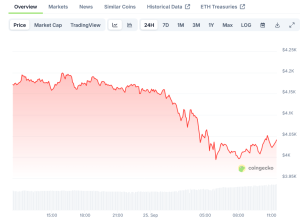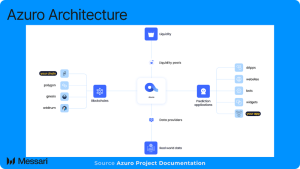Key Insights
- The Graffio communal art creation event brought 605,000 unique addresses and 1.3 million transactions in a 24-hour period. Community members drew on a communal digital canvas, receiving an NFT of the final version.
- In a mainnet-like testing environment, Aptos achieved a peak of 30,000 TPS and over 2 billion transactions in a day. Upgrades enabling the high performance, such as storage sharding and novel NFT solution Aggregators, will roll out on mainnet in 2024.
- Onchain order book infrastructure Econia launched at the end of November. It powers trading on several third-party protocols, including Aries Markets, whose TVL increased by 1,529% QoQ to $30.6 million.
- Aptos Labs and the Aptos Foundation formed partnerships with several large conglomerates and gaming companies, including Alibaba Cloud, SK Telecom, Readygg, and BlockGames.
- The Aptos network had an outage when block production halted on October 18. The incident was resolved within around 5 hours, and the root cause was identified as non-deterministic code in the FeeStatement module.
Primer
Aptos (APT) is a Layer-1 blockchain designed around the core tenets of scalability, safety, reliability, and upgradeability. Aptos was born out of Meta’s Diem and Novi projects, eventually launching in October 2022. Core developer Aptos Labs raised about $400 million in two 2022 private investor rounds.
Aptos’ technological stack features many novel aspects, including the AptosBFTv4 consensus mechanism, the Quorum Store mempool protocol, the Block-STM parallel execution engine, and the programming language Aptos Move. Aptos Move, which builds on the original Move language created by the Diem and Novi teams, offers enhanced flexibility and safety compared to other Web3 programming languages. Aptos Move is being co-developed by multiple protocols.
Other key features aim to improve user experience and safeguards, including accounts where private keys are decoupled from public keys, transaction pre-execution to explain the outcome of a transaction before a user signs it, and transaction expiration time and sequence numbers. Development of the Aptos network and growth of the Aptos ecosystem is primarily led by Aptos Labs and the Aptos Foundation. For a full primer on Aptos, refer to our Initiation of Coverage report.
Website / X (Twitter) / Discord
Key Metrics
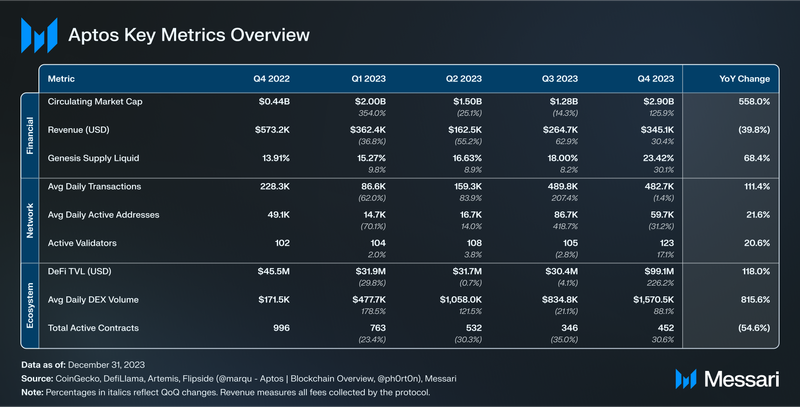
Financial Analysis
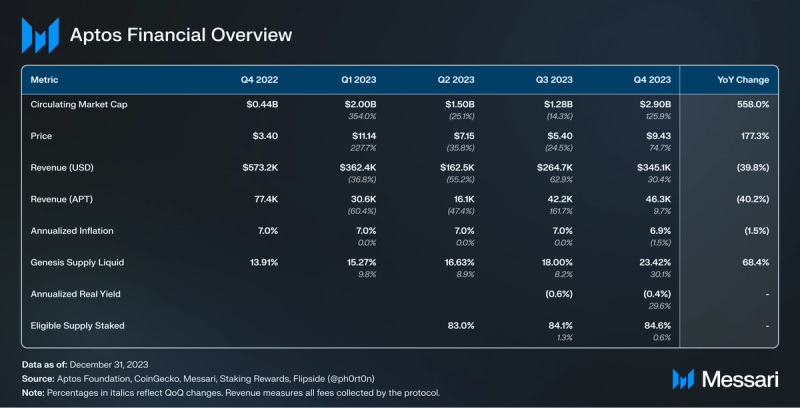
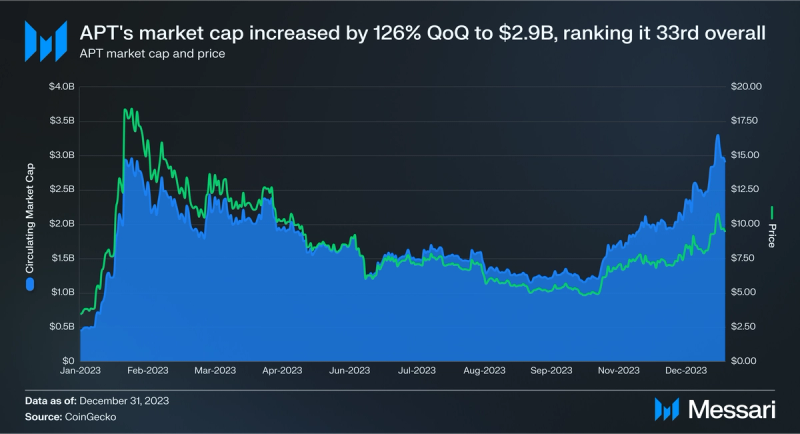
As a whole, the crypto market rebounded in Q4’23. APT was no exception – its circulating market cap increased 126% QoQ to $2.9 billion. Its growth slightly outpaced those with a similar market cap, as its market cap rank increased from 35 to 33 QoQ. With more supply unlocks occurring in the quarter, APT’s price increased by less than its market cap but was still up 75% QoQ.
Aptos revenue, i.e., all fees collected by the protocol, continued to grow in Q4 after bouncing back from lows in Q2. Denominated in APT, quarterly revenue grew 10% QoQ to over 46,000. With APT’s price appreciation, revenue in USD grew even more, by 30% QoQ to $345,000. Daily revenue spiked for several days near the end of December due to an inscriptions craze, which is covered in detail in the Network Usage section.
Currently, Aptos burns all revenue generated. At the moment, these burned tokens have not significantly reduced inflation.
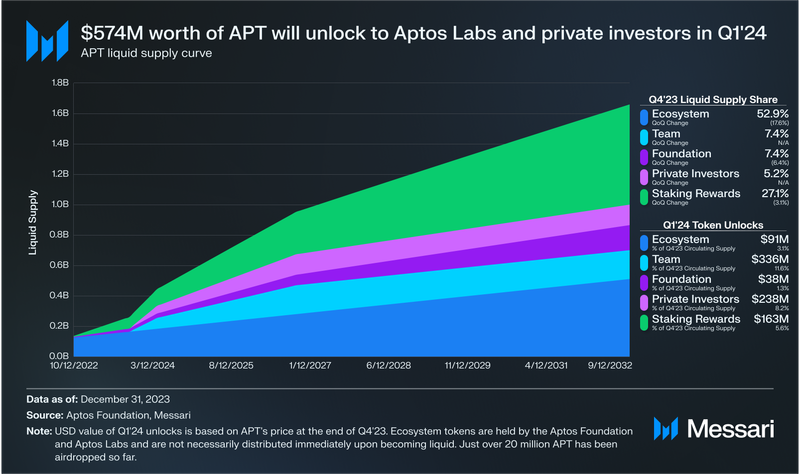
APT inflation began at a 7% annualized rate and will decrease by 1.5% each year until it reaches 3.5%. This yearly change occurred in mid-October, reducing the inflation rate to just under 6.9%. Note that this rate is based on the initial total supply of 1 billion APT. APT experienced other inflationary pressure coming from genesis supply unlocks. The genesis supply includes the 1 billion APT initially allocated but not staking rewards. By the end of Q4, over 23% of the genesis supply was distributed, a 30% QoQ increase.
Another 7.5% is set to unlock in Q1’24, with 48% of this unlocking to core contributors and 34% to private investors. Based on APT’s price at the end of Q3, $574 million will unlock toward those two categories, representing 20% of Q4’s circulating supply. FTX Ventures participated in Aptos Labs’ first fundraising round and co-led its second.
There will also be $91 million unlocking toward the Ecosystem category, although these tokens will not necessarily be immediately distributed upon becoming liquid. Note that before distribution, 80% of these tokens are held by the Foundation and 20% by Aptos Labs. These tokens are used for grants, incentives, and other initiatives. So far, just over 20 million APT from this allocation has been airdropped.
At the end of Q4, 85% of supply eligible to be staked was staked, a slight 1% QoQ increase. Note that locked tokens can still be staked and earn liquid staking rewards. In this case, the supply eligible to be staked is APT’s total supply rather than its circulating supply.
Network Analysis
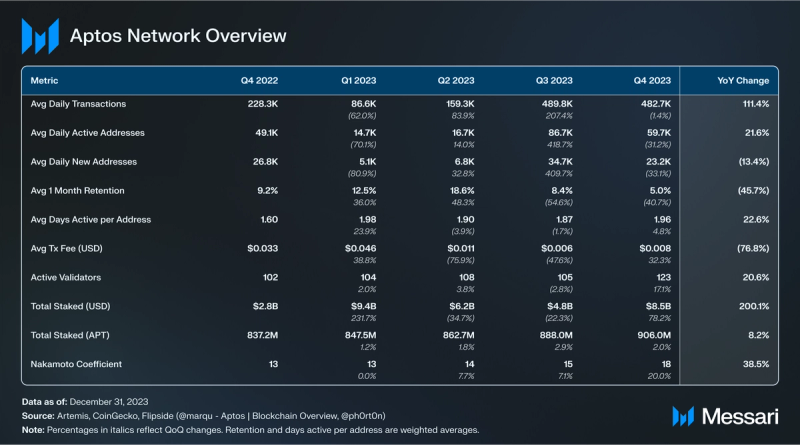
Usage
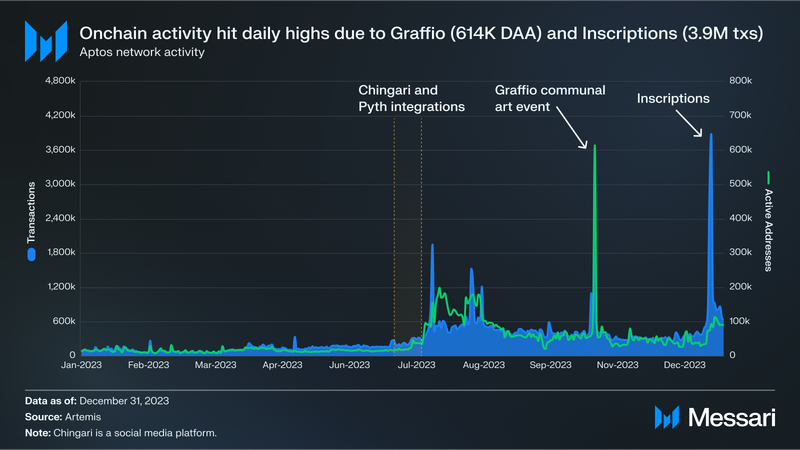
Network activity, measured by transactions and active addresses, decreased slightly in Q4 but remained at elevated levels compared to the first half of 2023. Average daily transactions and addresses decreased QoQ by 1% to 483,000 and 31% to 60,000, respectively.
The increase in network activity in Q3 was largely driven by social media platform Chingari, which began integrating with Aptos in early July, and oracle Pyth, which integrated with Aptos in mid-July. In Q4, there were two notable events that spiked network usage, the Graffio communal art creation even in mid-October and inscriptions near the end of December.
On October 19, daily active addresses reached over 600,000, driven by the Graffio communal art creation event. To celebrate the network’s one-year anniversary, Aptos contributors invited community members to draw on a communal digital canvas during a 24-hour period. Each individual drawing was registered as an onchain transaction. Participants then received an NFT version of the final canvas. The event brought 605,000 unique addresses and 1.3 million transactions.
During the event, there was a network outage, when block production halted on October 18. The incident was resolved within around 5 hours. The Aptos Foundation shared a postmortem on October 20, identifying the root cause as non-deterministic code. The problem stemmed from a performance-focused code change made to the Aptos-core codebase on August 22, 2023.
In late December, elevated transaction activity was driven by inscriptions, a trend prevalent on many blockchains. NFT marketplace BlueMove launched the APT-20 standard in mid-December. On December 23 and 24, there were a combined 6.8 million transactions, largely due to APT-20 mints.
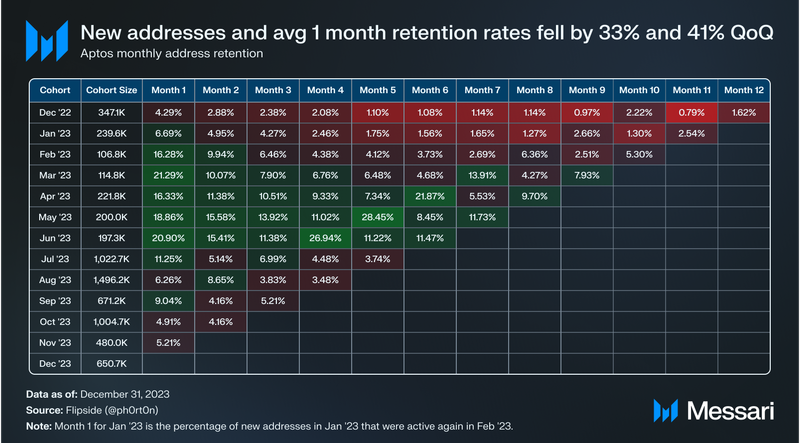
After increasing by 419% in Q3, average daily new addresses decreased by 33% QoQ to 23,000. The weighted average one month retention rate also fell by 41% QoQ to 5%. The October and November 2023 cohorts had the lowest one month retention rates since December 2022.
Security and Decentralization
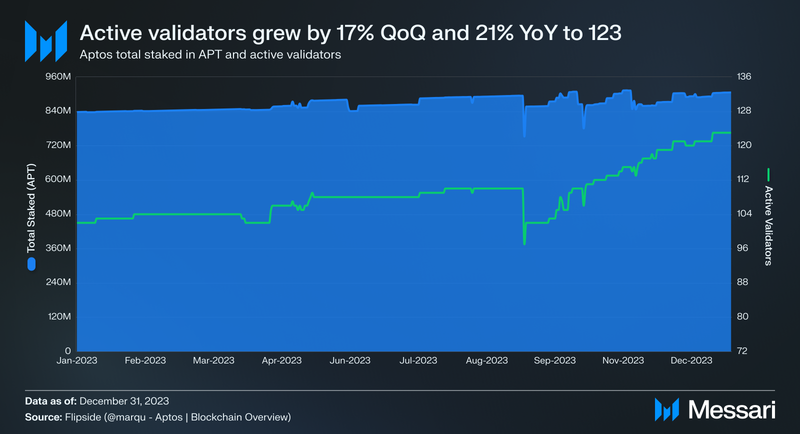
APT staked continued to grow, up 2% QoQ and 8% YoY to 906 million. With APT’s price appreciation, the growth of total staked denominated in USD is even more significant, up 78% QoQ and 200% YoY to $8.5 billion. As a result, Aptos further secured its place as a top network by staked market cap. As noted above, locked tokens can be staked and earn liquid rewards. Along with Aptos not having a slashing mechanism, staking for the ~77% of APT’s illiquid genesis supply becomes a very attractive option.
Active validators on Aptos have also grown since launch, up 17% QoQ and 21% YoY to 123. Around 17% of the validators accept in-protocol delegated stake, a feature that launched near the end of April 2023. At the beginning of October, Coinbase Cloud enabled APT delegation to its validator. The majority of stake for the other validators comes from out-of-protocol delegation from the Aptos Foundation and private investors’ locked tokens. The Aptos Foundation holds a majority of the total supply between its own allocation and the tokens on behalf of the Ecosystem allocation. As such, it can help distribute stake rather equally among validators. As a result, Aptos has a Nakamoto coefficient of 18, up 20% QoQ and 39% YoY, which is above the median of other networks.
Upgrades and Roadmap
Aptos is designed to support frequent protocol upgrades. This ability stems from validator management occurring onchain, allowing validators to easily sync to a new upgrade. Parts of Aptos are also written in Move, which can improve the time-to-market for developers.
The Aptos protocol continued upgrading in Q4 to 1.7.0 and then 1.8.0. These upgrades implemented several Aptos Improvement Proposals (AIPs), including making the fee payer address optional to facilitate sponsored transactions (AIP-53) and adding further support for cryptographic operations with new Move modules for ElGamal encryption, Pederson commitments, and bulletproofs (AIP-46).
To test and highlight several upgrades in the works, Aptos Labs published the findings from Previewnet, a testing environment designed to mirror Aptos mainnet. From November 6 to 21, the environment sustained over 9 billion transactions, 2 billion of which came during a 24 hour period. Peer-to-peer transactions per second peaked at 30,000, and over 1 million limited collection NFTs were minted in 90 seconds.
One of the primary upgrades that unlocked this higher performance was storage sharding. Planned to go live on mainnet in 2024, storage sharing splits the state storage into multiple RocksDB instances. Aptos Labs plans to also release details about improvements made to the execution engine, state synchronization algorithm, and network stack.
The improved NFT mint performance came from a new solution called Aggregators. Limited supply NFT mints traditionally require sequential execution due to their sequential naming (e.g., “Cryptopunk #4317”). Aggregators are a novel, conflict-free counter mechanism that enables essentially parallel execution of limited supply NFT mints. Aptos Labs recently published a blog post detailing Aggregators.
Aptos Labs is next targeting 100,000 TPS on its journey to exceed 1 million TPS. Beyond improvements tested in Previewnet, another major upgrade in development is a new consensus mechanism, Shoal. Shoal combines DAG and BFT qualities, reducing latency and increasing throughput.
Lastly, Aptos Labs is developing a new Aptos Move Compiler. It will bring a set of new language features that aim to streamline coding processes and expand functionality. These include Receiver Style Function Calls, First Class Higher Order Functions, and User-Defined Abilities. Aptos Labs expects to implement most of the new features in the first half of 2024.
Ecosystem Overview
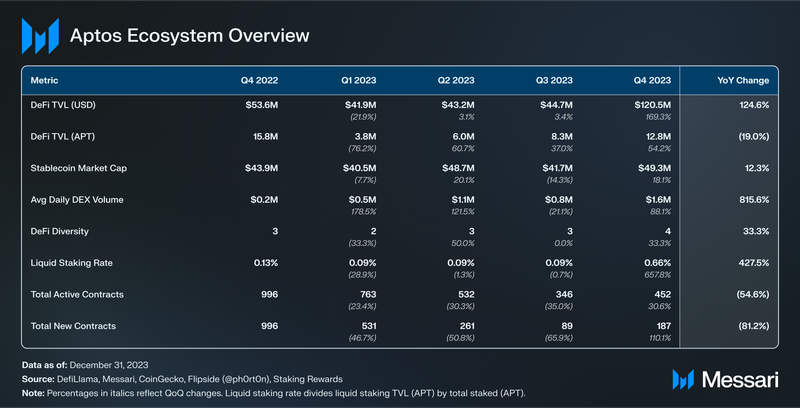
DeFi
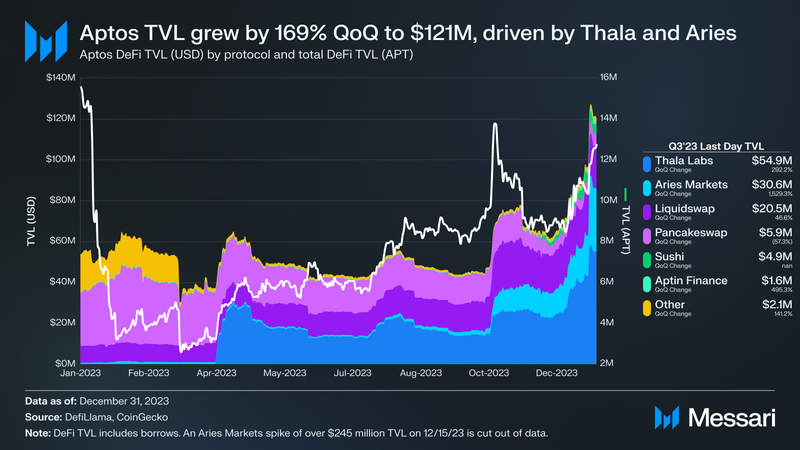
Overall, Aptos’s DeFi TVL increased by 169% QoQ to $121 million. It also increased in APT terms by 54% QoQ, indicating that the increase was not solely due to APT price appreciation.
At the end of Q3, Thala, Liquidswap, and PancakeSwap were all vying to be the top Aptos protocol by TVL, each with roughly 31% market share. In Q4, Thala’s TVL increased by 292% QoQ to $55 million. Its market share increased by 46% QoQ to 46%, as Liquidswap’s TVL increased by 47% QoQ and PancakeSwap’s TVL decreased by 57% QoQ.
Thala features a suite of DeFi products, including a CDP, an AMM, a liquid staking protocol, and a token launchpad. Near the end of November, Thala Labs previewed its upcoming DAO tool Parliament, which will enable teams to easily launch DAOs. Its CDP mints Move Dollar (MOD), a stablecoin with 8.3 million tokens in circulation as of December 26, 2023. Both MOD and THL are omnichain fungible tokens (OFTs). OFT is a multichain token standard created by LayerZero Labs that is interoperable with fungible token standards across chains. Most of MOD’s overcollateralized backing is based in LayerZero and Wormhole-based USDC. Overall, Aptos’ stablecoin market cap grew by 18% QoQ to $49 million.
Aries Markets’ TVL increased by 1,529% QoQ to $31 million, surpassing LiquidSwap and PancakeSwap. Aries Markets is a borrow/lend and margin trading protocol. At the end of November, it launched its trading product powered by Econia.
Econia is an onchain order book engine that launched at the end of November, after being formed during the 2021 Inaugural Aptos Hackathon. It raised $6.5 million in seed funding earlier this year in a deal led by Dragonfly. Beyond Aries, Econia’s infrastructure is currently powering trading on several other protocols that all launched in Q4, including Kana Trade, Gator Trade (developed by Pontem), SwapGPT, and Hippo Labs.
In late November, SushiSwap launched its V2 AMM on Aptos, making Aptos the first non-EVM supported by SushiSwap. By the end of Q4, SushiSwap had almost $4.9 million in TVL for a 4% market share.
Given that not staking costs ~7% dilution, liquid staking protocols will be crucial to continue growing Aptos’ DeFi ecosystem. Aptos’ liquid staking rate increased by 658% QoQ, but it still remains relatively low at 0.66%. In late-October, liquid staking protocol Amnis Finance launched. It reached over $29 million in TVL by quarter end, becoming Aptos’ top liquid staking protocol by TVL, above Thala’s liquid staking protocol at $20 million. To incentivize growth, Amnis launched a points program for the airdrop of its upcoming token.
Other DeFi-related events from Q4 include:
- Merkle Trade Launch: Merkle Trade is a perp DEX that launched at the end of October. There has been over $277 million in total trading volume on Merkle Trade since its launch, as of December 26, 2023.
- Oasis Pro Integration: Oasis Pro’s FINRA-registered marketplace integrated with Aptos in mid-November.
- BAPTSWAP Grant and V2: In early October, BAPT Labs announced that it received a grant from the Aptos Foundation to continue developing AMM BAPTSWAP. Near the end of December, BAPTSWAP V2 launched, adding support for fee-on-transfer tokens among other features.
- MSafe Updates: Multi-sig wallet MSafe released several new features in Q4, including a swap feature powered by LiquidSwap.
Consumer
Social
As noted above, social applications such as Chingari and Graffio have been driving Aptos network usage. The new social applications launched in Q4 include Overmind and FIND OUT.
Overmind is a platform that first featured Quests where developers can compete in coding challenges to earn rewards and onchain credentials. In partnership with the Aptos Foundation, Overmind has awarded developers around $50,000 through its Quests. In mid-October, it opened early access to its open-source, decentralized social network and soon after launched “Race to Keys,” incentivizing developers to build a friend.tech-esque Keys feature.
In mid-December, Aptos Labs released FIND OUT, an AI-powered Q&A platform. On FIND OUT, users earn points by asking questions and voting on other people’s questions.
Gaming
Gaming has been another core consumer-related focus for Aptos Labs and Foundation. The team is developing a module for verifiable onchain randomness, a crucial aspect of gaming and other applications. AIP-41 proposes creating a new Move module which will enable developers to easily add onchain randomness into their smart contracts. Once it’s implemented, there are plans to host a hackathon devoted to building with onchain randomness.
Near the end of October, arcade-style shooter Aptos Arena launched with over $10,000 in prizes for the first week. It attracted over 12,000 addresses in the first weekend and is working on updates to address feedback from initial playing.
Aptos Labs and the Aptos Foundation formed partnerships with several notable gaming companies and conglomerates, including NPIXEL, NEOWIZ, and the Lotte Group. New partnerships and developments from Q4 include:
- MARBLEX: After partnering with the Aptos Foundation near the end of August, Netmarble’s Web3 subsidiary MARBLEX officially integrated with Aptos. The MARBLEX WARP Bridge connects Aptos to MARBLEX’s existing gaming ecosystem, including its MBX token and in-game NFTs.
- Readygg: Readygg is an infrastructure company aiming to bring Web2 gamers into Web3. It partnered with Aptos Labs in late November to help Web2 game publishers integrate their games with Aptos.
- BlockGames: BlockGames is building a cross-chain, cross-game network of games and players. In early November it announced plans to integrate Aptos in partnership with Aptos Labs.
- GuardianLink: In mid-December, Aptos Labs partnered with NFT marketplace Jump.trade, developed by GuardianLink, to launch existing and new games on Aptos, beginning with its Web3 cricket game Meta Cricket League.
NFTs
In Q4, there was $2.5 million in total NFT trading volume, a 460% QoQ increase. Of this volume, 51% occurred through marketplace Topaz, followed by 31% on BlueMove and 13% on Wapal. The increase in volume was driven by inscriptions. As noted above, BlueMove launched the APT-20 standard in mid-December. On December 14, BlueMove sustained over $285,000 daily NFT sales volume.
Wapal is an NFT marketplace for “pro traders,” similar to Blur and Tensor, which launched in Q3. In early December, it released an NFT launchpad. NFT aggregator Mercato also released an NFT launchpad at the end of October.
NFTs on Aptos have also been used for several real-life use cases. KYD Labs is a Web3 ticketing company. In early October, it released its Shopify plugin. The plugin allows artists to provide exclusive merchandise to concert attendees, with payments powered by the Aptos network. At the end of October, Aptos Labs furthered its partnership with NBCUniversal by launching digital fan experiences for the movie The Exorcist: Believer. In early November, the Aptos Foundation partnered with South Korean amusement park and media group Seoul Land. Seoul Land’s digital-focused subsidiary RXMeta will launch Bloom, a new festival experience powered by NFT ticketing and memberships on Aptos.
Development and Growth
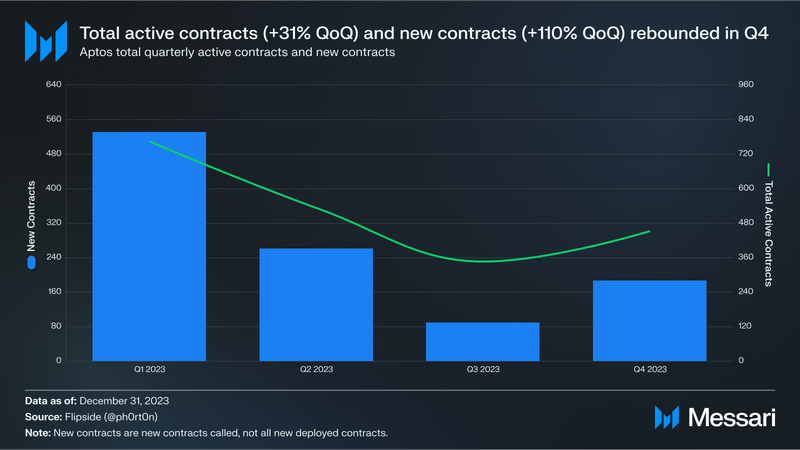
After declining throughout 2023, total active and new contracts rebounded in Q4. Total active contracts increased by 31% QoQ to 452, with total new contracts called increasing by 110% QoQ to 187.
Aptos Labs, the Aptos Foundation, and other organizations will look to continue this recent trend through developer resources and infrastructure as well as grants, hackathons, accelerators, and other initiatives.
Notable developer-related releases in Q4 include:
- TypeScript SDK: In early December, Aptos Labs released a redesigned TypeScript SDK with several upgrades implemented based on feedback from community members.
- Identity Connect: In mid-November, Aptos Labs released Identity Connect, a solution enabling developers to integrate social logins with Web3 applications.
- Aptos MoveGPT: In mid-November, Move Developers DAO (MDD) released a GPT tailored for Aptos Move development.
- Aptos Gas Profiler: At the end of November, Aptos Labs released the Aptos Gas Profiler, a tool that helps developers better understand the gas usage of Aptos transactions.
Beyond the grants and partnerships mentioned throughout the Ecosystem section, Q4 initiatives include:
- Alibaba Cloud Partnership: In late November, Aptos Foundation partnered with Alibaba Cloud to grow the Web3 developer community in the APAC region. The partnership includes Aptos Foundation being the leading blockchain sponsor for Alibaba Cloud’s Singapore Innovation Accelerator program and collaborating to launch a Move developer community in Asia. It also includes co-hosting a series of hackathons and other events.
- SK Telecom Partnership: In early November, Aptos Labs partnered with SK Telecom and its technology partner Atomrigs Labs, with plans to develop a Web3 wallet service called T wallet. Aptos is SK Telecom’s first non-EVM partner.
- Outlier Move Accelerator Graduates: Outlier Ventures ran a 12-week Move Accelerator program in partnership with the Aptos Foundation. In early October, the program ended, with a demo day later in the month to highlight the 8 participating projects.
- Hack Singapore Winners Announced: Hack Singapore was Aptos Foundation’s third hackathon of the year, occurring in mid-September. With sponsorship from Jump Crypto, GSR, Alibaba Cloud, and Google Cloud, the hackathon offered over $200,000 in prizes. At the end of October, Hack Singapore winners were announced. IntoTheVerse won the NFTs, Social, and Gaming track; AptosPay won the DeFi and Payments track; dAptoRator by NetSepio won the Infrastructure, Tooling, and Public Goods track; Econia won the Move’s Most Innovative track; and Aptscan won the Web3 x AI track.
- ABCDE Highlight: In early November, Asian Web3 venture and accelerator studio ABCDE Highlight partnered with the Aptos Foundation to launch an Asian-focused grant program and grow community engagement.
- Move Developers DAO (MDD) Events: Indian-based developer community MDD hosted several hackathons and other events in Q4, including Pune Blockchain Days and REVA HACK.
- Aptos Winter School: The Aptos Foundation is hosting a two-week accelerator for student developers in India in the second half of December.
- Galxe Quests: In early December, the Aptos Foundation announced a four-week onchain quest campaign powered by Galxe.
Closing Summary
Q4 wrapped up Aptos’ first full calendar year. It was a year of growth, with many key metrics increasing YoY. Network usage picked up in the second half of 2023 due to integrations of social media platform Chingari and oracle Pyth. In Q4, the network featured two activity spikes driven by the Graffio communal art event and then inscriptions. During the Graffio event, there was a network outage, which was resolved within 5 hours. Aptos grew in other areas, including Aptos’ DeFi ecosystem and the many partnerships formed by Aptos Labs and the Aptos Foundation. Two notable Q4 partnerships were Alibaba Cloud and SK Telecom.
In early December, Aptos Labs previewed the heights possible for Aptos in 2024 when it published the findings from Previewnet. The testing environment achieved a peak of 30,000 TPS and over 2 billion transactions in a day. Upgrades enabling the increased performance, such as storage sharding and novel NFT solution Aggregators, will roll out on mainnet in 2024. Aptos Labs’ next target is 100,000 TPS on its journey to exceed 1 million TPS.

